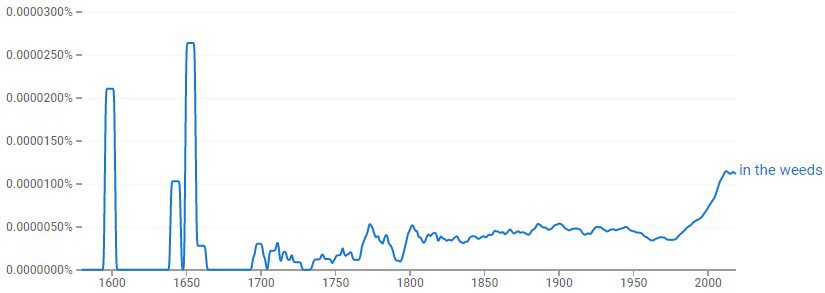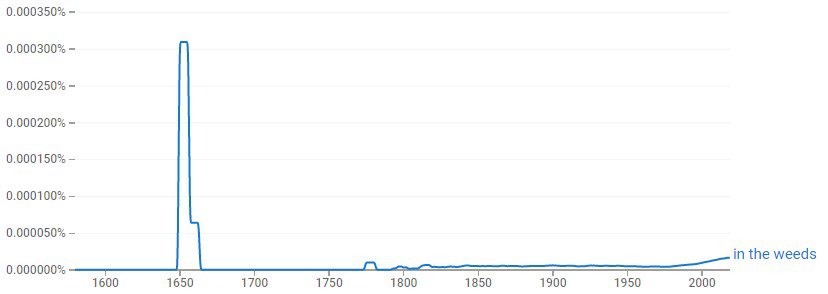If you feel lost, frustrated, or very focused on current problems, work, or personal life, you may feel like you are in the weeds with things.
This well-known idiom has been in use since at least the 1600s with periods or popularity in reference to different societal issues or problems.
Although its origin is not precisely known, it is a descriptive term worth understanding to help describe your own situation. Take a look at what it means and what other terms you can use as a replacement.
In the Weeds Meaning
In the weeds is an idiomatic phrase with different meanings but is synonymous with either being overwhelmed or intensely focused on a current problem or situation.
Both suggest being lost in or entangled with the issue due to the imagery offered by the words.
Origin

Since the exact origin of the phrase cannot be attributed to any one group or publication, it is widely accepted that it came into use during the European colonization of Caribbean islands who also brought with them the slave trade.
The cultivation of rice and sugar required many hands to rid the area of weeds for planting, and it is possible the term came about to describe the escape of slaves through the deep weeds when they were blocked from view.
It became popular again during Prohibition in the 1920s, possibly describing the hiding of bootleg liquor in thick weeds and bushes since storing on the premises was a liability and illegal.

The term has stayed much more consistently popular in British English usage through the years, supporting the theory that it did begin on English colonized land and plantations, and then spread through the American colonies through the years.
Today, it is often used to explain the frustration of a problem or societal issue that has become “too much” to an individual or group.
It can also be used to describe being deep or too far in the weeds while attempting to root out details of an issue in order to come to a solution. In this scenario, the information is usually meaningless, and one has become entangled too deeply in the “weeds”.
It has also influenced variances in use and word substitution.
In the Weeds Synonyms and Substitutions
The most accepted synonym is to be experiencing difficulties. But idiomatic variances such as in a pickle, in a sticky situation, lost in a jungle, up a creek, on a slippery slope, or on rocky ground all suggest the same and may be influenced by the term in the weeds.
In the weeds, also occasionally may be used with word additions to create a more detailed application. For example, lost in the weeds or stuck in the weeds is also commonly heard.
Examples Of In The Weeds Being Used In A Sentence
“You can get lost in the weeds right after a big album, a big major release, in a singing competition,” said Hicks, 43. (The Union Leader)
It might seem academic to political scientists who can get lost in the weeds of the swampy morass of state governance, but it is a crucial consideration that weighs on the minds of everyone who thinks going to the polls will bring about results. (The Insider)
Let’s Review
In the weeds is a well-known term that has given rise to many variations, all of which suggest the same thing: being stuck or frustrated in a situation that is hard to get out of.
It also can be used to describe a person wasting their time with too much detail in their attempts to solve this situation.
Read some of the idioms we covered: